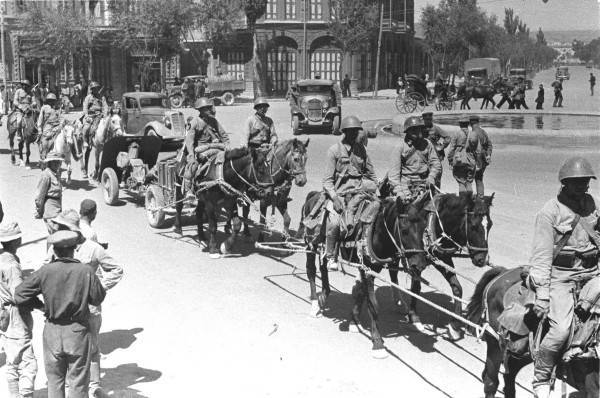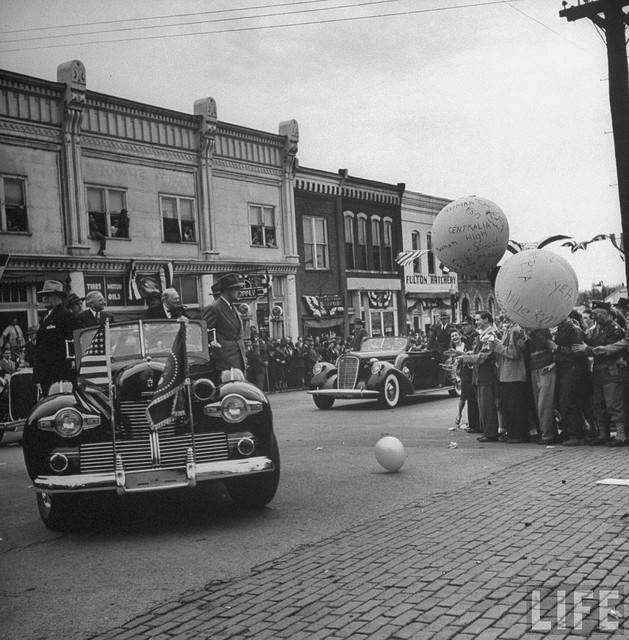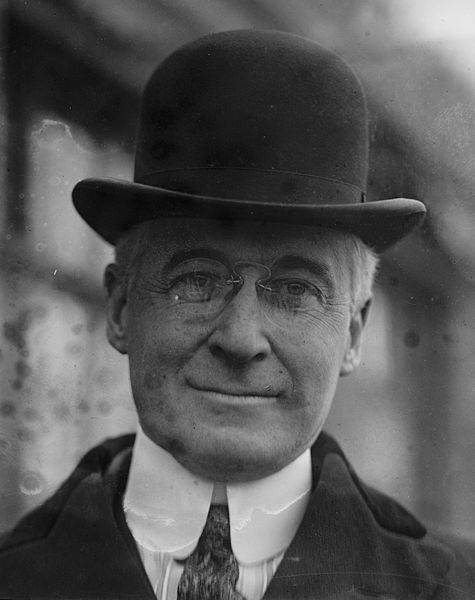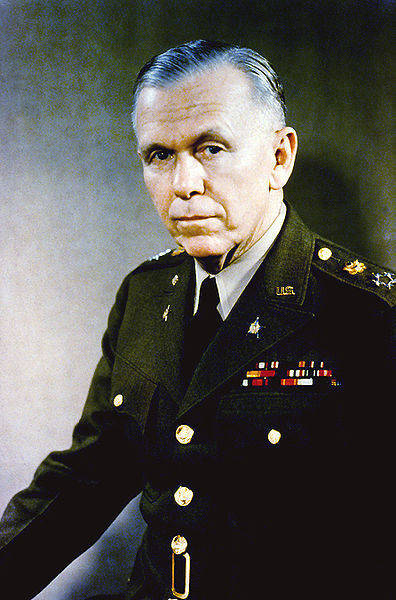About the beginning of the Cold War
Many explain this cooling by the death of Roosevelt, who was more friendly to the USSR, and the coming to power of a hostile Truman. This is fundamentally wrong, Roosevelt "was friends" with the USSR in order to finally seize the leadership from England, putting it in a subordinate position, and the time for open confrontation with the Soviet Union did not come — it was necessary to finish off Germany, to crush the Japanese empire. Truman's team was still the same, without major changes. “World backstage” of the time, financial aces that put (and put) on the seats of the US presidents of their people, was not going to change their plans - a system of “unipolar world” headed by the United States, where England was in the “junior partners” . The weakened USSR was supposed to fall or isolate in order to fall after a certain period of time.
A mechanism, an improved League of Nations - UN, was created to control the planet, which was supposed to create a system of "collective security". And for this it was necessary to stop the claims of the Russians - after all, Stalin was de facto leading a real Russian great-power policy, he was advancing, demanding, pushing the interests of the Union. So, at the Potsdam Conference (July-August 1945 of the year), he decided on the borders of Poland (the Poles should thank Stalin for the significant expansion of their territory at the expense of Germany), on the joint administration of Germany, the USSR received the right to receive reparations from Germany in kind - factory equipment, machinery, etc. Moreover, the USSR took everything that it wanted from its zone of occupation and a quarter of the equipment from the western zones of occupation - French, British, American. Stalin demanded to actually give away what the Russian Empire deserved with the blood of its soldiers in the fields of the First World War: the Kars and Ardagan regions of Turkey (they were given to Turkey in 1921, Trotsky and Lenin), provide the USSR with free passage through the Bosphorus and Dardanelles, give the Union territory for building a naval base in Thrace.
Why claims were presented to Turkey that did not fight in the Second World War, it is understandable - even though Ankara remained neutral, it was hostile to the USSR. So, in the difficult year of 1941 for our country, the Turks kept 26 divisions on alert at the border with the USSR, so the USSR had to keep four armies in the Caucasus - at the front from the Black to the Caspian Sea, which would be useful in Ukraine or near Smolensk, Moscow, Leningrad . And then three armies had to be introduced, together with the British forces, into Persia, thereby restraining the Turks from active operations. Yes, in 1942, when there were bloody battles in the southern strategic direction, the Nazis rushed to the Caucasus, stormed Stalingrad, had to keep one army in Transcaucasia, and in Iran a cavalry corps, a rifle division and tank brigade. Ankara supported Germany and its natural resources, in particular, chrome ore, which was of strategic importance. According to the Minister of Arms, Reich Speer, to stop the supply of this ore - and in six months the industry would begin to “starve”, and in a year would die. Deliveries stopped only in August 1944, when Soviet troops arrived in the Balkans.

Our troops in Iran.
Were geopolitical, historical considerations, Stalin perfectly remembered the "insults" of Russia - Turkey made good money at the expense of the Russian Empire, it was time to pay the bills, return the land. The issue of straits was of centuries-old importance for Russia - free access to the Mediterranean Sea. That is, there were plenty of reasons to start a war with Turkey, as well as with Japan.
But the West has rejected Moscow’s claims. When the UN meetings opened in October of 1945, it became clear that they wanted to turn this body into a global tribunal with the right to intervene in any conflicts between countries, resolving them in their favor. The USSR could only oppose using the veto in the Security Council, since it did not have many satellite countries, allies. But he would have lost such a right if the conflict had touched the USSR itself, such a promise could bargain for Roosevelt at the Yalta Conference. Therefore, it was impossible to start a war with Turkey, the USSR would be turned into an international outcast.
In March, X. NUMX sounded W. Churchill's famous Fulton speech, where Russia was openly called the enemy of the West, and called for the consolidation of forces to fight it. It seems like Churchill was no longer an official, the British government was not responsible for him, but the effect was tremendous. Truman attended, and Churchill organized a US tour of Bernard Baruch, the closest advisor to Roosevelt, made enormous money during the war, the "gray cardinal" under Truman.

At this time there was a clash of interests in Iran-Persia. Northern Persia under the Russian Empire was our sphere of influence, we owned oil concessions, housed Russian troops. After the collapse of the Russian Empire, the British cleaned up the whole of Iran. In 1920, the Red Army entered the northern regions of Iran, the Gilani Soviet Republic was formed, but it did not exist for long - Trotsky actually gave our oil concessions to the American company Standard Oil of New York. Stalin decided to restore our positions here, a project of a Soviet-Iranian oil company was created. But the Iranian government, behind which the British stood, opposed. Then, using the experience of the Anglo-Saxons, Moscow supported the opposition - the Tudeh party, national minorities, in December 1945 in the north the Azerbaijan Autonomous and Kurdish People's Republics were proclaimed. London, in response, sent additional military forces to southern Iran, it smelled fried. The United States did not intervene, but informally supported London.
Stalin was against the war, so he made a compromise, for which he spoke from the very beginning - we are withdrawing troops, joint companies are being created, a joint oil production agreement is signed with Iran. But Moscow was simply "thrown" - after the withdrawal of troops, Iran terminated the agreement, and the movements of Kurds and Azerbaijanis were brutally suppressed.
Westerners began to violate the agreement and in Germany - the USSR did not transfer a quarter of the equipment from the western occupation zones, responded to requests from the Soviet side with refusals. The political games began with “democracy”, so at the London Conference of Foreign Ministers of the victorious powers, the western “allies” reported that they would not sign peace treaties with Romania and Bulgaria, since the elections there were “not democratic”. At the Moscow Conference, Molotov made concessions, Moscow agreed to new elections, but the West immediately made a noise that, they say, the USSR with this step confirmed the falsification of the previous elections. Due to these disagreements, the Paris Peace Conference in July 1946 was failed.
They attacked the SCCS due to the help of Albania and Yugoslavia to the Greek partisans ELAS, although they did it without Soviet participation. Moscow honestly fulfilled the conditions of the division of the Balkans and did not interfere in the affairs of the Greeks. There was a fuss over Turkey: the USSR offered Turkey joint protection of the straits, the Turks refused. Then Moscow pressed through Bulgaria, she made territorial claims to the United States, they were supported by England and France, and they sent their fleets to the Aegean Sea.
In February 1947, Truman outlined to the US Congress the doctrine of helping "free nations resisting enslavement attempts by an armed minority or external pressure." The first such assistance received Greece and Turkey. In the United States, two main goals were formulated in relation to the USSR: the doctrine of “restraining communism” —not allowing the expansion of the sphere of influence of the USSR the doctrine of "rejecting communism" - to reduce the zone of influence to the borders before the start of the Second World War, to weaken and eliminate socialism in Russia.
Baruch’s plan and Marshall’s plan were finally drawn up. In the summer of 1946, Bernard Baruch presented to the UN a plan to create a special body for the control of atomic energy. He was supposed to be "supranational", but was really under the control of the United States. The UN SC’s "veto" did not apply to it. All countries were forbidden not only to create nuclear weaponbut also conduct scientific research in this area. Only this institution could give permission for any type of activity related to nuclear energy. Received the right to freely monitor in any country. In fact, the United States received a monopoly on nuclear weapons, the ability to stop such developments, get into the internal affairs of other countries, control their scientific developments. Moscow, of course, refused, she was immediately accused of “aggressive intentions”. The Westerners and the reciprocal project of the USSR — the convention on the complete and unconditional prohibition of nuclear weapons, with the destruction of already existing products — were buried.

Bernard Baruch.
J. Marshall in January 1947 put forward a plan for the allocation of significant financial resources for the restoration of the European economy. In June, an international conference was convened on this issue in Paris. It soon became clear that under this idea lies a plan for the financial and economic enslavement of the European countries of the United States. Therefore, on July 2, Molotov interrupted the negotiations, saying that “the European countries that were put under control would lose their economic and national independence in order to satisfy the needs and desires of some great powers.” The USSR was supported by the countries of Eastern Europe, including Finland, they refused such “help”.
Only after all this, the USSR headed for the creation of a socialist camp. In Eastern European countries, coalition governments are changing to communist regimes. On the cries of "democracy" Stalin found a counterargument. It was announced about the creation of "people's democracies", Western "democracies" in this situation turned out to be anti-people, because there the real power belongs to the financial and industrial oligarchy.
The struggle unfolded in the countries of the "third world" - the victory of the USSR over Germany made possible the collapse of the colonial empires. The real wave has gone: Indonesia, North Vietnam gained independence in 1945, unrest in Syria and Lebanon began in 1946, India and Pakistan gained independence in 1947, Burma and Ceylon won in 1948, communists won in China and North Korea, and so on. d. At one time they were supported by the United States, since believed that after the collapse of the colonial empires, these states will inevitably end up in financial and economic, which means political dependence on the United States. But after the war, it was not a unipolar world, a bipolar world that was formed, countries were given the opportunity to choose.
The most important struggle was for Germany, Moscow was not satisfied with the plans of the Anglo-Saxons, they led to the fact that Germany would again become an enemy of the USSR, we did not take Berlin for this. But the Soviet proposals on the demilitarized, neutral status of the country were blocked by the West. As a result, the Westernizers began to create their own state unilaterally - in 1947, they combined three zones into one, in 1948, they introduced a new currency, they began to hold elections to the constitutional assembly. In response, Marshal Sokolovsky left the Inter-Allied Control Council for Berlin, on June 24, roads that led to West Berlin were blocked. The West was asked to stop the creation of a new German government, but they did not stop, an “air bridge” was installed.
In 1948, the West actually imposed economic sanctions against the USSR and the countries of “people's democracy” - a large list of strategic goods was compiled, they were forbidden to be brought into the social bloc countries. Stalin did not flinch, he was sure that his resources were sufficient. In 1949, the CMEA was created (Council for Mutual Economic Assistance), the world market split into two isolated parts.
In the course of the Marshall Plan, Western countries became “clients” of the United States, losing much of their political independence. In April, NATO created 1949, in the same year they proclaimed the creation of the Federal Republic of Germany (Federal Republic of Germany), in response to the USSR created the GDR (German Democratic Republic). Along the borders of the USSR began to create a network of military bases, plans are being developed for striking nuclear weapons on Soviet cities, the subsequent land invasion, with emphasis placed on the maximum possible extermination of the population.
But Stalin’s USSR endured, accomplished a real feat - in just one five-year plan it was possible not only to restore what was destroyed in the war, but also to exceed the prewar level of production development by 73%! The state not only did not come down in depression or collapsed under the weight of problems, it made a tremendous breakthrough in development. In 1949, the United States was deprived of a monopoly in nuclear weapons, so instead of a direct conflict, it was necessary to start a so-called. "Cold war".

J. Marshall.
Sources of:
Vert N. History of the Soviet state. M., 1994.
Kara-Murza S. G. Soviet civilization: from the beginning to the Great Victory. M., 2001.
Kara-Murza S. G. Soviet civilization: from the Great Victory to the present day. M., 2001.
http://topwar.ru/4541-kak-u-nas-pytalis-odolzhit-pobedu.html
http://topwar.ru/3382-o-tom-kak-soyuzniki-sssr-po-antigitlerovskoj-koalicii-xoteli-sovershit-nemyslimoe.html
http://topwar.ru/4132-kak-stalin-otstoyal-interesy-polshi.html
Information